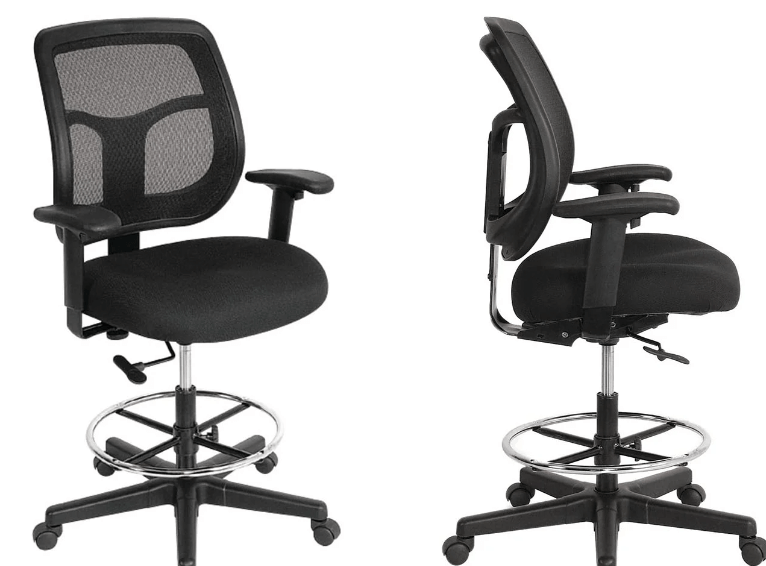You’re wondering about using the drafting chair vs office chair. And you locate a piece that’s discussing the distinctions between these two categories of chairs. So you should read the following text. Come with us to examine the key points of distinction and determine which one is the finest.
Comparison Table: Drafting Chair Vs Office Chair
Examine the following for an in-depth analysis table of the two styles of seats.
| Drafting Chair | Office Chair | |
| Seat | Has a taller design. It can to adjust to a height of 30 inches | Has a shorter design and can adjust to a height of 22 inches |
| Adjustment | High adjustability about the armrest, backrest, and height | Less adjustability, almost only height |
| Price | Cheaper than office seats. | More expensive than sitting on stand seats. |
| Backrest | Middle or low backrest | Middle or high backrest |
| Armrest | With or without a basic armrest | Most of them have armrests |
| Footrest/ Footring | Most have foot rings or footrests, only a few don’t | Most don’t have foot rings or footrests |
| Headrest | Non-present | Present or absent |
| Users | Anyone can use it, suitable for standing desks | Anyone can use it, suitable for normal desks. |
What Are The Key Differences Between Drafting Chairs And Office Chairs?
The fundamental distinction between an office chair and a drafting chair is that the former has an additional foot ring, and the latter typically has a higher seat height. Drafting chairs are also typically less expensive.
In the upcoming section, we’ll explore the key differences between the drafting chair vs office chairs.
Comfort
Both sit-stand seats and office chairs can offer comfort, but workplace seats often put cushioning and padding for long sitting periods. Drafting seats may have firmer seats and minimal cushioning as they focus more on providing a stable platform for elevated workstations.
Ergonomics
While both types of chairs can incorporate ergonomic features, office seats generally have a more comprehensive range of adjustable features like seat height, backrest angle, and armrests. This adjustability promotes better posture and caters to a variety of body types. Sit-stand seats, while often adjustable in height, may have fewer ergonomic features overall.
Design and style
Office seats tend to come in a wider variety of design styles, from traditional to modern, with options for different upholstery materials. Sit-stand seats often have a more utilitarian design focused on functionality and stability rather than aesthetics.
Portability
Workspace chairs are generally designed for mobility, with wheels for easy movement around the workspace. Drafting chairs, particularly those with a higher height range and stability requirements, may be less portable and need wheels.
Adjustability
Office seats typically offer more adjustable features compared to sit-stand chairs. This includes adjustable seat height, backrest angle, armrests, and even headrests in some models. Drafting seats generally have adjustable seat height as their primary adjustment.
Lumbar support
While both types of seats can offer lumbar support, office chairs often provide more adjustable and customizable lumbar support options. sit stand chairs may not have as many lumbar support adjustments since they prioritize stability and a fixed seating position at elevated workstations.
Purpose to use
Office chairs are designed for typical workspace tasks, including desk work and computer use. They are meant for general workspace settings. Drafting chairs are intended for use in drafting, design, or art-related work, often on elevated surfaces like tables or desks.
Price
The price range for drafting chairs can vary depending on the features and brand, but they typically range from $25 to $200.
The price range for office chairs can vary depending on the features and brand, but they typically range from $100 to $500.
It’s essential to consider your specific needs, tasks, and preferences when choosing between drafting chairs and workspace chairs, as each serves different purposes and offers distinct features.
Drafting Chair Vs Office Chair: Which One Is The Best?

Depending on your job requirements, how high the job surface is, ergonomics, and mobility, you should decide between an office seat and a sit-stand seat.
Office chairs are more suitable if you only work at a standard desk height. They offer an ideal seating position for routine office tasks. A sit-stand seat could be ideal if the job requires a higher surface.
The adjustability of the seat height, backrest angle, and armrest is emphasized in workplace chairs. A drafting chair is preferable if you need a more excellent range in changing seat height arrangements.
To facilitate activity, office chairs have roller and swivel wheels. Wheels can appear on sit-stand seats, but they must be more flexible. An office chair could provide more convenience if you need to move about.
Read more: Types Of Office Chairs
Conclusion
The preceding content examined the basic characteristics of the drafting and office chair. Every type of seat has unique qualities, so you should pick the one most suits your job’s requirements. If you have any questions for us, please leave them listed below.
For more info about this subject, prefer this video:
FAQ





